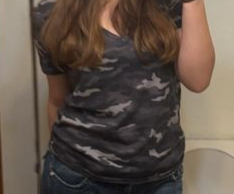Peet freshmen using mock trials in English
Freshmen at Peet Junior High are putting their debating skills to the test by performing mock trials in their English classes this week. Teachers Brian Suiter and Nathaniel Norby have two separate court cases in which students get about two weeks to prepare for court. Norby said, “I am not sure of the exact start of mock trials at Peet, but we have been doing them for at least the last six years.”
Because there are multiple roles that students can do, they learn about each role after hearing the case and then fill out Google forms for what their top three choices are. Norby said that he assigns students roles by viewing their choices then “balance that with their aptitude/attitude. I try to put them in a role where they will be successful. Some students love to be lawyers and others would much rather be witnesses. Student choice is important. A student who really doesn’t want to be a lawyer probably won’t do well at it.”
In the non-honors classes, students are also allowed to be on a jury. In honors classes they are each assigned a role where they will have to present to the judge. Students will either be on the plaintiff’s side or the defendant’s side and will have to memorize their witness statement or be prepared to present the case as a lawyer.
There are civil court cases and criminal cases, and Suiter chooses a trial for the students, but Norby talks about how “I actually don’t choose the specific cases. Students do. Every year there are new mock trials and these materials are available for free. I pull cases that look interesting and then have my English sections vote on which ones sound the most interesting; they almost always choose a murder or involuntary manslaughter case, but I have had classes choose ones that are civil cases as well.”
In Suitor’s class, students are assigned a trial. Kaylee McSweeny said that “I think it would be cool if there were multiple trials and as a class you got to choose which one you found the most interesting.”
Students are quickly introduced to their cases and have one day to choose their top three options for roles. Once those roles are selected, students get together in each class period to form their teams of either defense or plaintiff and start finding key points they want to present in their direct examination and cross examination, along with the opening and closing statements to overview the case.
Students are given a booklet on objections and use a slideshow link with videos to learn key points and how to present/examine witnesses during the trial.
After preparing with their team for the week, the trials begin. Each class period will start their trials in their classroom with Suiter or Norby, and if there is an additional team for plaintiff and defense, they will go in a separate “court room” with a different staff member to act as the judge. Starting with opening statements, one lawyer from each team will present the opening statements to present the viewpoint.
Next, each side will have a lawyer directly examine their witnesses with questions and answers that they have agreed on. Freshman Rebekah Chagdes said, “I really enjoy it. It’s not only something different than writing essays or free reading, I also love the group dynamic, and my group is just really fun.”
Then a lawyer from each team will cross examine the opposing sides witnesses with questions designed to prove their sides points. During the examination of witnesses, opposing sides may object if they find that the side questioning has done something against the rules when asking questions. The questioning side can defend themselves and the judge will determine the ruling on that situation.
Finally, another lawyer will present the closing statement to end their part of the trial by summarizing and submitting their final points. The “judge” or staff member will have been grading during the course of the trial and will submit the results to the students once the trial is done. “We grade them off of a speaking/reading rubric. It’s like a normal speaking presentation, but it has elements of drama sprinkled in. People need to play characters and know their roles. Many students find this less intimidating than standing up in front of their peers by themselves and having a team rooting for them makes it more engaging,” Norby said.
Students have different viewpoints on the trials. Some appreciate the fact that they get to work in a group and do not have to write a paper or take a test. McSweeny said, “I think they are really fun. It’s nice to take a break from ‘normal’ English things and get to do something new.”
Others wish that teachers taught more about what the process was like or that it was something they could create and perfect or edit like other assignments. Chagdes said that there could be “more communication” to improve the learning process, but “I love the whole crime/court stuff, so this is fun for me.”
Norby said that “mock trials are a great experience for students. The presentation helps them think on their feet, gives them insight into how our legal system works, demonstrates the importance of a jury and overall lets them apply an argument that they get to compete at in a class. It is an assignment where it doesn’t matter if they win or lose; I just want them to have fun while they learn and compete at something new. I want to create life-long learners, and this is a great opportunity to do that.”










You must be logged in to post a comment Login